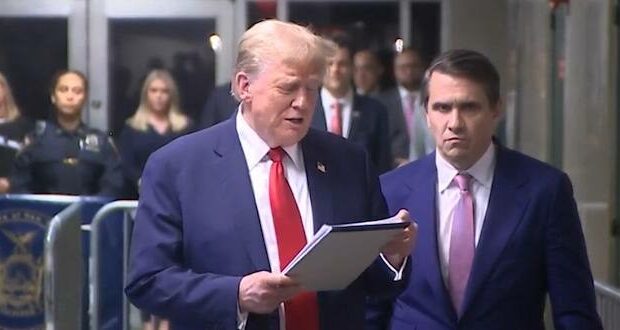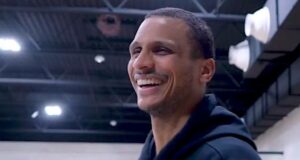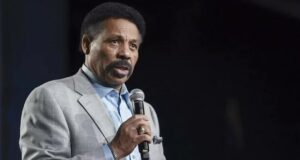Judicial Watch has reviewed the New York trial of Donald Trump and provides this look at the proceedings and facts.
The Trump prosecution rested its case Monday with a central question unanswered: where’s the crime?
Manhattan District Attorney Alvin Bragg has been dancing around the question for months. The prosecution produced a cacophony of tawdry testimony from a porn star (Stormy Daniels) and a former Trump aide turned convicted felon turned cooperating witness (Michael Cohen) but their claims had little to do with the allegations at the center of the case. Trump is charged with thirty-four felony counts of falsifying business records, generally a low-level misdemeanor. But New York state law elevates the misdemeanor charge to a felony if the defendant’s “intent to defraud includes an intent to commit another crime,” and that’s where Bragg has placed his big bet.
That other crime? Bragg insists he doesn’t have to name it. The “law does not so require,” he said at a news conference announcing the indictment—and in a court filing he doubled down, citing a legal finding that there is “no requirement” to “establish what particular crime was intended.” Good luck putting that one past a jury of New Yorkers.
Bragg has offered several theories of “another crime.”
“The primary crime we have alleged is New York state election law section 17-152,” a Bragg prosecutor told the court in the opening days of the trial. “The entire case is predicated on the idea that there was a conspiracy to influence the election in 2016.”
But Trump is not charged with an election law violation, and Bragg is on shaky legal ground with a 17-152 prosecution. A Washington Post search revealed only three prosecutions in forty-five years for violation of the statute. In one case, the defendant was acquitted; in the two others, charges were dropped.
Bragg also has suggested Trump violated federal campaign finance laws. In a court filing, Bragg alleged that Trump violated the federal Election Campaign Act by purchasing and suppressing “damaging information” from porn star Stormy Daniels. Other prosecutors have looked at this attempt to stretch a state charge to include a federal crime with skepticism. Both Bragg’s predecessor as Manhattan DA, Cy Vance, and the U.S. Attorney for the Southern District of New York declined to charge Trump in the case.
Mark Pomerantz, a senior Vance prosecutor who resigned after differences with Bragg on Trump prosecutions, is dismissive of the state-federal gambit. In his book, “People vs. Donald Trump,” Pomerantz writes that the DA’s office spent a lot of time on the “gnarly legal question” of whether the “other crime” clause on the New York state books could be expanded to cover a federal crime. The issue has “never been litigated,” Pomerantz notes, and “no one could predict with certainty how an appellate court might eventually rule.”
Bragg’s third “another crime” gambit is perhaps the strangest: tax fraud. In a “Statement of Facts” accompanying the Trump indictment, Bragg suggests that Trump violated New York tax laws by conspiring with Michael Cohen to file a fraudulent tax return “that mischaracterized, for tax purposes, the true nature of the payments made in furtherance of the scheme” to buy the silence of Stormy Daniels. Cohen, according to Bragg, paid Stormy Daniels $130,000. But Trump repaid Cohen $420,000. Why? According to the DA, so Cohen could then “characterize the payment as income on his tax returns, instead of a reimbursement,” leaving Cohen with a tidy $180,000 profit.
Jacob Sullum notes in Reason: if “Cohen mischaracterized a reimbursement as income on state or city tax forms, that would be a peculiar sort of fraud, since the effect would be to increase his tax liability. This theory of ‘another crime’ requires jurors to accept the proposition that tax fraud can entail paying the government more than was actually owed.”
Cohen admitted in court Monday to stealing money from the Trump Organization, an admission that damages the prosecution’s key witness.
Can Bragg overcome Cohen’s credibility problems and sway the jury? The cards are stacked in Bragg’s favor. The DA, his top prosecutor, and the judge all have close ties to a Democratic Party that apparently will stop at nothing to inflict damage on the Republican presidential frontrunner.
Judicial Watch has reported on Bragg’s strong ties to New York progressive politics. As New York state’s chief deputy attorney general, he helped lead a lawsuit against the Trump Foundation that resulted in its closure and a $2 million fine. In August 2022, he convicted Trump Organization chief financial officer Allan Weisselberg on charges of tax fraud and falsifying business records. In December 2022, he convicted the Trump Organization on charges related to off-the-books payments to Weisselberg and others. Bragg makes no secret of his anti-Trump bias. “I’ve sued Trump more than a hundred times,” he’s proudly noted.
In December 2022, Bragg recruited senior Justice Department official Matthew Colangelo—the lead prosecutor in the current trial—for the Trump prosecution team. In the Biden Administration, Colangelo served as acting associate attorney general and principal associate attorney general. Prior to going to Washington, Colangelo worked on the New York state attorney general’s investigation of the Trump Foundation. In 2018, Colangelo was paid $12,000 for “political consulting” by the Democratic National Committee. In the Obama White House years, he served as deputy director of the National Economic Council, chief of staff at the Labor Department, and deputy associate attorney general in the Justice Department’s Civil Rights Division.
The presiding judge at the Trump trial, Juan Merchan, found himself in hot water earlier this year when news emerged that his daughter, Loren Merchan, was president of a left-wing digital advertising firm, Authentic Campaigns. The firm has close ties to high-profile Democrats, including Joe Biden, Kamala Harris, and Adam Schiff. Trump vigorously protested and Merchan responded with a gag order. His daughter aside, Merchan himself is worth a closer look. Like virtually all New York judges, he came up through the ranks of the Democratic Party’s political machine. Though considerably weakened by decades of fitful corruption reform, machine politics still plays a big role in the state’s judicial appointments. Merchan began his career as a prosecutor in the Manhattan DA’s office, moved on to the state attorney general’s office, and was appointed a family court judge by Mayor Michael Bloomberg in 2006. In 2009, he was appointed to his current position at criminal court. In July, Merchan received a “caution” letter from the New York Commission of Judicial Conduct warning him about donations to Joe Biden and other Democratic causes.
Will any of this matter with the jury? Judges and prosecutors have many ways of putting a thumb on the scale of justice. But juries famously often surprise, and no-nonsense New Yorkers—even those from deep blue Manhattan—may look with considerable skepticism at a courtroom that appears to be piling on a famous defendant and a prosecutor who won’t even name the crime at the heart of the case.
–Micah Morrison is chief investigative reporter for Judicial Watch. Used with permission.
Judicial Watch, Inc.is a non-partisan educational foundation promoting transparency, accountability and integrity in government, politics and the law. Through its educational endeavors, Judicial Watch advocates high standards of ethics and morality in our nation’s public life and seeks to ensure that political and judicial officials do not abuse the powers entrusted to them by the American people. Judicial Watch fulfills its educational mission through litigation, investigations, and public outreach.
 Metro Voice News Celebrating Faith, Family & Community
Metro Voice News Celebrating Faith, Family & Community 








